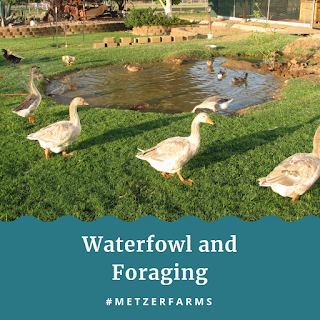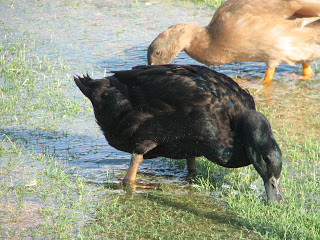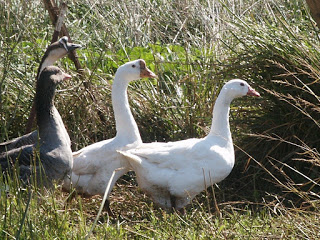Friday, March 29, 2019

Ducks are your typical omnivores. You will find that your yard will have less of a problem with pests as their favorite food consists of snails, slugs, beetles, worms, and flies. If you have a mosquito problem, you will find their numbers diminish with a duck around.
If given the choice between a bug or other protein source and regular feed, they will typically choose the bug. Beware if you have an ornamental fish pond as ducks naturally love fish.
They can and will try to nibble on whatever they can get their bills on. This includes but is not limited to various young greens such as grass, shrubs, flowers, vegetables, and your fingers and toes ??, but they would prefer regular feed and bugs instead.
If given the choice between a bug or other protein source and regular feed, they will typically choose the bug. Beware if you have an ornamental fish pond as ducks naturally love fish.
They can and will try to nibble on whatever they can get their bills on. This includes but is not limited to various young greens such as grass, shrubs, flowers, vegetables, and your fingers and toes ??, but they would prefer regular feed and bugs instead.

Our Runner ducks are the best of the bunch when it comes to foraging, especially when it comes to bugs and pests. Their ability to cover large areas and their longer necks make it easier for them to hunt down and catch anything that runs from them.
The Khaki Campbell, Mallard, and Silver Appleyard we find to also be very good foragers, though not on the same level as Runners when it comes to pests. Our Pekin breeds and White Crested, however, not so much. They just don’t seem to travel as much. All other duck breeds are good at foraging.
Geese are not as omnivorous as ducks. Their first choice of food will be grass, grains, and pelleted feed - in that order.
Some customers have told us that their geese have completely removed the grass from their pen area, so if you plan on having them on pasture, make sure there is a plenty of space with lots of grass. When presented with some type of meat or bug, however, they will typically turn their noses up. Worms, either freeze dried or alive, do not appeal to them, and they will rarely go after flies. Our
White and Brown Chinese breeds are our best geese foragers. Their smaller bodies and longer necks allow them to poke around in places other geese would not be able to. Beware of our larger breeds, the Large Dewlap Toulouse and Super African, as they can be rather lazy when it comes to foraging. All other breeds are good foragers and will have no problem on pasture.
The Khaki Campbell, Mallard, and Silver Appleyard we find to also be very good foragers, though not on the same level as Runners when it comes to pests. Our Pekin breeds and White Crested, however, not so much. They just don’t seem to travel as much. All other duck breeds are good at foraging.
Geese are not as omnivorous as ducks. Their first choice of food will be grass, grains, and pelleted feed - in that order.
Some customers have told us that their geese have completely removed the grass from their pen area, so if you plan on having them on pasture, make sure there is a plenty of space with lots of grass. When presented with some type of meat or bug, however, they will typically turn their noses up. Worms, either freeze dried or alive, do not appeal to them, and they will rarely go after flies. Our
White and Brown Chinese breeds are our best geese foragers. Their smaller bodies and longer necks allow them to poke around in places other geese would not be able to. Beware of our larger breeds, the Large Dewlap Toulouse and Super African, as they can be rather lazy when it comes to foraging. All other breeds are good foragers and will have no problem on pasture.

How much a duck and goose will forage will depend on how much regular feed they are receiving. If they are allowed free feed at all times, they will still wander about looking for especially tasty morsels, but not to fill an empty stomach. This also equates to less destruction to your yard or garden. If they are kept on a strict diet, then their foraging will pick up.
If you are looking to geese for removing specific weeds in your field, garden, pasture, or orchard, they can be taught to consume a specific plant or pest. The trick is to feed them what it is you want them to eat starting when they are only days old. This makes it so that they prefer that particular plant over other options when on their own. That doesn’t mean they will not eat anything else, but when given the choice, if they have gotten used to the taste of something in particular, they will usually choose it over something else.
Ducks and geese are typically good foragers. Some more than others. We have charts on our website for Ducks and Geese showing the breakdown of each breed by attribute including foraging ability. These charts will come in handy for you since choosing a breed with good foraging ability is important if you plan on keeping your birds on pasture or using them as your pest control army.
If you are looking to geese for removing specific weeds in your field, garden, pasture, or orchard, they can be taught to consume a specific plant or pest. The trick is to feed them what it is you want them to eat starting when they are only days old. This makes it so that they prefer that particular plant over other options when on their own. That doesn’t mean they will not eat anything else, but when given the choice, if they have gotten used to the taste of something in particular, they will usually choose it over something else.
Ducks and geese are typically good foragers. Some more than others. We have charts on our website for Ducks and Geese showing the breakdown of each breed by attribute including foraging ability. These charts will come in handy for you since choosing a breed with good foraging ability is important if you plan on keeping your birds on pasture or using them as your pest control army.